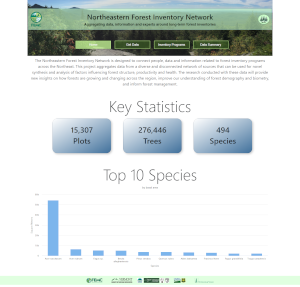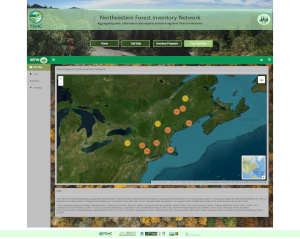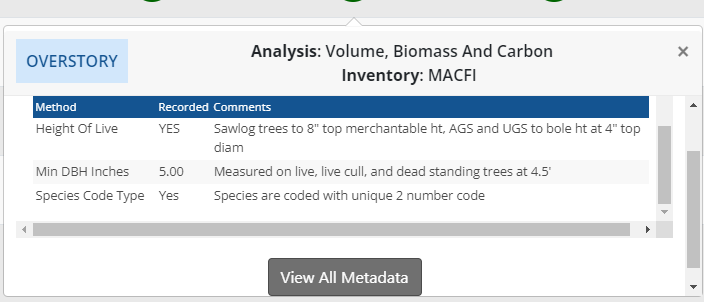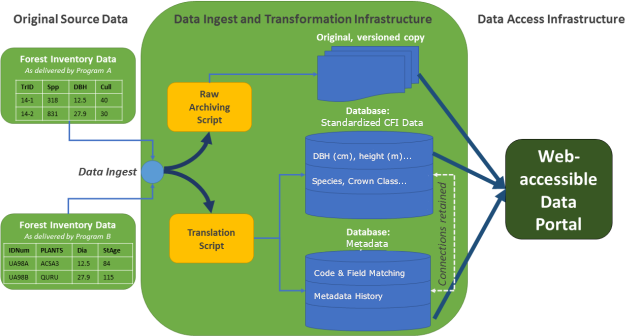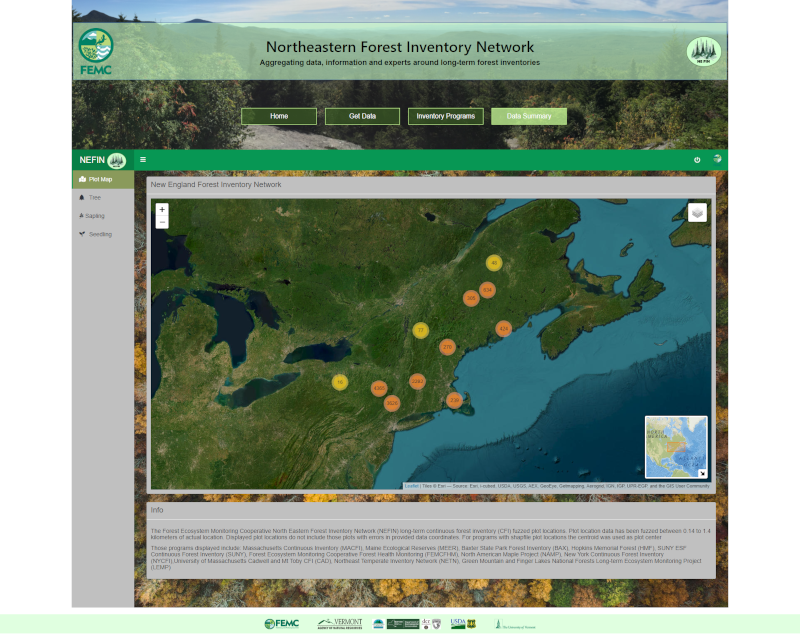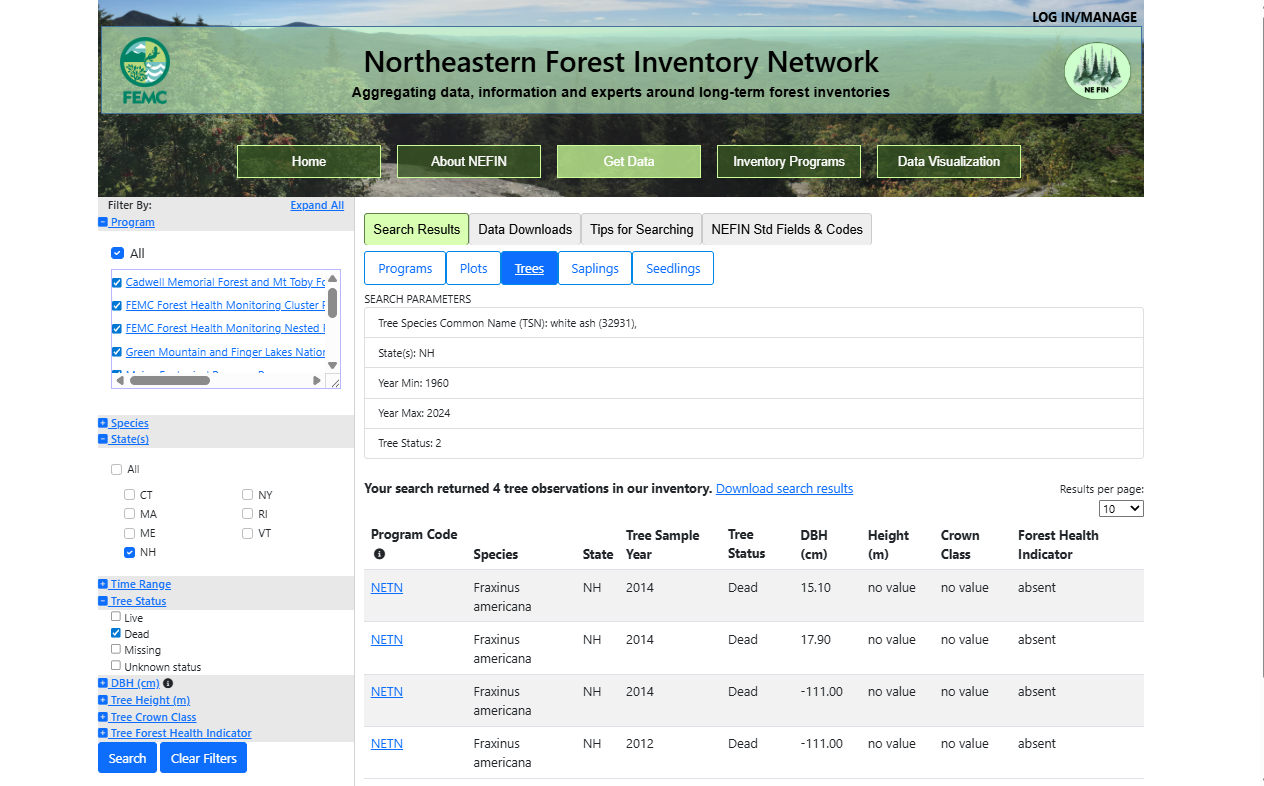NEFIN: The Northeastern Forest Inventory Network
Project Objective
The Northeastern Forest Inventory Network (NEFIN) aggregates and standardizes continuous forest inventory (CFI) data from monitoring programs across the Northeast US into a comprehensive web portal which allows users to search, visualize and download CFI data.
The NEFIN project builds from our work on the CFI Program Comparison Tool, an assessment of methodologies from various CFI programs in the Northeastern US.
Overview
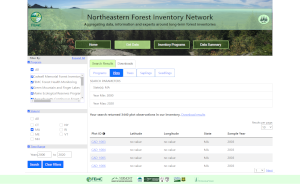
There are numerous continuous forest inventories (CFI) that have recorded forest conditions across the Northeastern United States for the past several decades. Although these efforts have often been focused on a limited geographic domain or set of forest conditions, integration of multiple, long-term inventories provides a unique opportunity to inform regional forest management and scientific applications. The NEFIN project was developed as a collaborative effort led by the FEMC to create a truly unified and application-driven database.
The goals of this project are to
- Increase the accessibility and usability of forest inventory data from disparate collections in the northeastern US
- Demonstrate how the research community can utilize this data for investigating trends in and drivers of forest growth and yield over time
- Increase connections among practitioners across administrative and disciplinary boundaries to enable greater exchange of information and expand collaborations around analyzing trends in northeastern forests
The products from this project include a comprehensive web portal which allows viewing, filtering, visualizing and downloading the CFI data available in NEFIN. Visit the Products to get more details on the products available.
Project Quick Facts
Last Update:
2025
Tool Completion Date:
2023
Products:
Project Contributors:
Current FEMC Staff:
Former FEMC Staff:
Have Questions?
Contact FEMCAbout
The heterogeneous, temperate forests of the northeastern United States (US) represent a complex history of management, conservation, natural disturbances, and site characteristics that make assessment of trends and patterns of forest metrics a challenge. Because of the spatial and structural complexities across forest stands, forest inventory sampling intensity must be sufficient to capture the variation across the landscape. Further, the drivers of change in these forest systems have been variable across time, space, and scale. The economy of the predominantly forested states of Massachusetts, Maine, New Hampshire, New York, and Vermont (hereafter, the ‘region’) depends heavily on the health and sustainable management of its forest. While the relative contribution of forestlands to the gross domestic product for these states is among the highest in the US (4-5%) (Forest2Market 2016), the forests face increasing pressures from land use and ownership changes, declines in available forest products markets, and greater presence of disturbance agents (e.g., invasive pests, extreme weather events). Developing predictions of the future forests require a solid understanding of the current productivity, composition, structure, and condition across the landscape.
While the USFS FIA program is a robust and useful resource for assessing forest condition, it is limited in spatial resolution (i.e., 1 plot per ~2,000 ha) and temporal scope (i.e., >1999 and re-measured every 5-7 years), and focuses on tree status metrics. Consequently, this project involves enriching FIA data with additional data collection sites, as well as inclusion of stands with previous or active forest management to help elucidate how management and forest change interact. This expanded database of field inventory data will allow us to ask several pressing research questions about forest structure and function over time, and the role that site, climate and disturbance agents play in those patterns.
The NEFIN Project builds on previous work conducted by the Forest Ecosystem Monitoring Cooperative. Through its "Continuous Forest Inventory Program Comparison Tool", FEMC assessed the methods and comparability of 10 CFI programs from the Northeast. Launch the Continuous Forest Inventory Program Comparison Tool to see commonalities and differences in these programs.
Using this information, an engine was developed to process data from many of these studies into the NEFIN standardized data format. We also document the contributing methodologies and techniques for standardization across datasets, and make that information available for download.
The image below illustrates the NEFIN data management workflow, where different datasets are processed in order to match codes and fields for standardization. An original copy of the data is saved, and methodologies analyzed and documented.
The data search and download tool provides filters to subset and download the standardized data, original program data, and any available files or scripts used in the creation or processing of the original and standardized data.
The standardized data synthesized from multiple sources can now be analyzed as a single dataset.
NEFIN: CFI Data Tool
The NEFIN CFI data tool is a web portal which provides users the opportunity to filter, explore and download continuous forest inventory (CFI) data from a variety of programs and studies collecting CFI data.
The tool has a robust set of filters, allowing users to find data from specific states, time periods, species, size classes and other metrics such as crown class and forest health status, a visualization tool which provides graphics of trends over time for filtered data and a download portal which allows downloading the standardized and original CFI data. Full details on each program and the data collection methods used are available at the portal.
NEFIN: Data Management Portal
Once a program is setup in NEFIN, the data management portal is a self-serve tool used by CFI program managers to update their data as new measurements become available. The tool performs quality control and standardization and allows for programs to specify any changes in their data collection methodology.
Recorded Webinar
Click here to view our webinar that shares how to use the Northeastern Forest Inventory Network.
Contributing Data
We are continually trying to increase the amount of data in NEFIN and improve its utility. If you have a CFI program and want to add your data to NEFIN, we will work with you to make that process as simple as possible. Here are the steps to take:
- 1. Read the overview: Adding your program to NEFIN.
- 2. Download and review the NEFIN program setup package.
- 3. Contact FEMC to get assistance in completing the templates and have your program setup.

